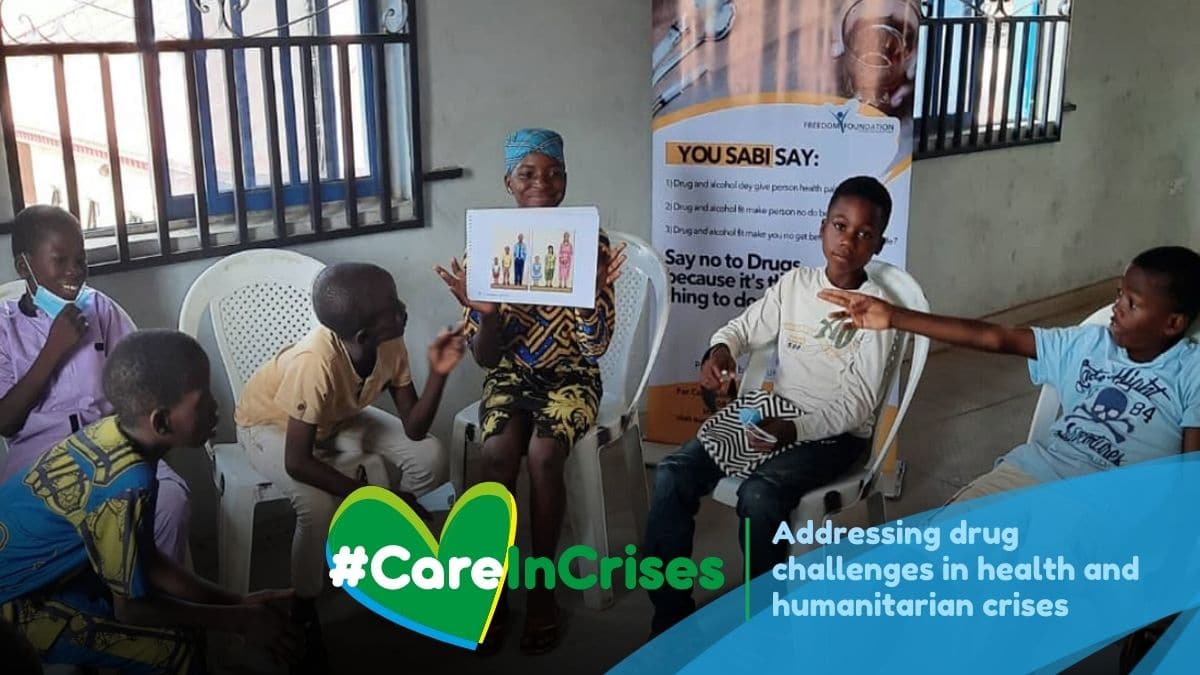
The theme of World Drug Day 2022 is ‘health and humanitarian crises’. To commemorate the Day, UNODC is highlighting its work on drug prevention and treatment around the world, particularly in crisis situations.
Nigeria, 24 June 2022 – Yemisi, a student at a university in Nigeria, had two problems in early 2020.
She was a drug user. And she was pregnant – without the knowledge of her conservative Nigerian family, who were also unaware of her drug habit.
When Nigeria imposed a lockdown following the outbreak of COVID-19, Yemisi’s university closed, and she had to return to her family. Already five months pregnant at the time, Yemisi had yet to enroll in prenatal treatment and was using a cocktail of drugs – cannabis, codeine, diazepam – all harmful to her and her unborn child. Yemisi worried most about how her father, who was severely ill, would react.
“I use drugs to cope with feelings of anxiety, failure, and disappointment,” Yemisi confessed. “I’m pregnant and worried that my sick father will find out and it will lead to his death. I can’t bear that thought.”
Stories like Yemisi’s have become more and more common in Nigeria due to a humanitarian crisis in its northeastern region. According to the UN Office for the Coordination of Humanitarian Affairs, an estimated 8.4 million women, men, and children are in need of humanitarian assistance in 2022. Attacks by non-state armed groups, together with conflicts over land rights, have displaced millions and decimated livelihoods and the provision of essential services.
According to the UN Office on Drugs and Crime (UNODC), drug use and drug use disorders are increasingly recognized as major causes of morbidity and mortality in many conflict or disaster-affected situations. Displaced populations may be vulnerable to such disorders for numerous reasons, including pre- or post-displacement stress and trauma, loss of homes and livelihoods, violence, torture, and family separation. COVID-19 exacerbated such challenges, as the health crisis disrupted the traditional delivery of services and treatment to people using drugs.
Nigeria’s COVID-19 lockdown meant that the estimated three million Nigerians living with some form of drug use disorder were at risk of losing access to treatment options.
Help arrived for Yemisi via a friend who shared the telephone number for DrugHelpNet, a network of drug treatment service professionals providing over-the-phone assistance to drug users during the lockdown.
Yemisi called DrugHelpNet’s counsellors. “I’m worried that I might not have access to drugs and won’t cope with my current situation without using drugs,” she told them.
“I’m still traumatized from the brutal loss of my mother during the farmer-herder crisis in our community,” she continued, referring to the often-deadly disputes over the shrinking amount of land available for farming and grazing.
“My life is ruined and I feel useless.”
But thanks to DrugHelpNet, Yemisi was given a place to live and received both prenatal care and psychosocial support, placing her on the path to recovery. DrugHelpNet also connected her with a suicide prevention group to manage her suicidal thoughts.
“Before now, I felt like this pandemic had strangled the last ray of hope I had to make things right,” Yemisi shared. But after receiving the first three weeks of support, Yemisi said she had learned “how to cope with my cravings,” adding that “my sleep has improved…I’m also not using as much as before.”
Yemisi is one of over 1,000 drug users who have benefitted from DrugHelpNet since its launch in April 2020. DrugHelpNet is composed of over 80 frontline health workers, including medical doctors, drug counsellors, and allied professionals across the six geopolitical zones in Nigeria. It includes seven drug treatment drop-in centres, supported by the European Union-funded “Response to Drugs and Related Organised Crime Project”, implemented by UNODC.
As COVID-19 restrictions ease in Nigeria and worldwide, the Nigerian Society of Addiction Medicine – the current manager of DrugHelpNet – hopes to make the network a more permanent structure. Initiatives underway include efforts to create toll-free lines for DrugHelpNet to increase accessibility to its services.








